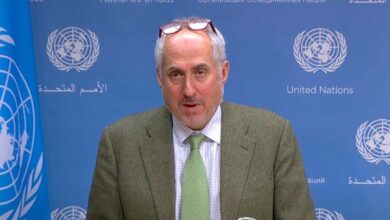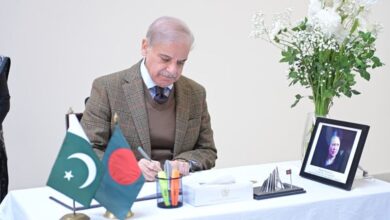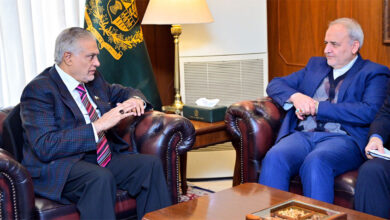Pakistan Playing Key Role in the US-Taliban Talk
By Sajjad Shaukat
Despite hurdles, the fifth round of peace talks which started between the US negotiators and the Taliban in the Doha-the capital of Qatar on February 25, this year, is making progress gradually. Hinting that US forces could leave Afghanistan within five years under a Pentagon plan offered as part of a potential deal with the Taliban to end the nearly 18-year war, The New York Times reported on March 7, 2019, “Nearly 11 days after peace negotiations between the United States and the Taliban began with high hopes…it has become clear that any resolution to the 18-year war could be frustratingly slow. One of the most prominent issues thwarting progress is a disagreement over a fundamental question: What is terrorism, and who is a terrorist? The answer is so important because the two sides had already agreed in principle on a framework for two crucial issues: the withdrawal of American troops, and a commitment that Afghan soil would not again be used to launch terrorist attacks against the United States and its allies…American negotiators have insisted on specifying that Afghanistan not be used by “terrorist” groups, but the Taliban have resisted, saying there was no universal definition of terrorism”.
However, the meetings between the interlocutors restarted over in Doha after a temporary halt to allow for internal consideration. Conflicting reports are coming about the progress of the dialogue, as these delicate talks are being conducted by both the sides with much care. In this regard, Taliban spokesman Zabihullah Mujahid said on March 4, 2019: “The current round of talks in Doha is advancing on a step-by-step basis. As the issue at hand is immensely crucial and delicate, it’s progression is taking place with much care and vigilance…the negotiations continue to focus primarily on a potential US troop withdrawal from Afghanistan and a pact to prevent Afghanistan from being used as a safe haven for terrorists…no understanding has so far been reached about any agreement or document.”
The latest meetings follow marathon negotiations in January, this year, which saw the US and the Taliban walk away with a draft framework on the two issues. America has insisted for a ceasefire and the opening of a dialogue between the Taliban and the Afghan government whom the former considered puppet regime of the US-led Western countries. However, the Taliban repeatedly rejected the demands, while the continuation of the talks followed a major attack on a joint US-Afghan base in southwestern Afghanistan’s Helmand province on March 1, this year with at least 23 Afghan security forces killed.
Although the US has not clearly released a statement regarding the status of the talks, yet it has admitted Pakistan’s central role in the negotiations between America and the Taliban leaders. In this connection, while giving briefing to the US Senate Armed Services Committee on March 8, this year, the head of the US Central Command (CENTCOM) General Joseph Votel has lauded Pakistan’s role for maintaining peace and stability in the region. The General elaborated, “We have had some success with Pakistan, they’ve been more helpful in terms of bringing the Taliban to the [Peace negotiating] table…positive steps [Of Pakistan] to assist Ambassador Zalmay Khalilzad in support of Afghanistan reconciliation by facilitating talks with the Taliban. As we have requested [from] them, we have seen instances where they have taken action against the safe haven areas of the militants”. In a discourse in CBS programme-“Face the Nation” on February 3, 2019, US President Donald Trump has made it clear that he is determined to get out of “endless wars” in Afghanistan and Syria. President Trump stated: “I have been hitting very hard in Afghanistan and now we are negotiating with the Taliban…If you look at Afghanistan we are going in very soon we will be going into our 19th year spending $50 billion a year”.
American President Trump’s determination and gesturing has already manifested in the diplomatic manuvours of Khalilzad, resulting in silver-lining for Afghan peace process in Doha. It is notable that the war in Afghanistan is America’s longest military intervention which has cost Washington nearly US $.1.7 trillion. Hence, positive shift in America’s policy towards Islamabad, seeking cooperation and re-establishing the association, have raised hopes regarding the probability of peace in the war-torn Afghanistan. It is mentionable that in the aftermath of Pulwama terror attack in the Indian Occupied Kashmir and escalation of tension between Pakistan and India, on February 28, this year, US President Trump hoped that Pakistan-India tension will de-escalate soon—the United States has been mediating between the two sides and trying to have them stop. Trump also acknowledged that Washington has improved her relations with Islamabad shortly. Particularly, Mike Pompeo, US Secretary of State stated that he has spoken with the leaders of India and Pakistan and has urged them to avoid “any action that would escalate and greatly increase risk”.
American State Department deputy spokesperson Robert Palladino said on March 5, 2019 that Secretary of State Mike Pompeo played an essential role in de-escalating tensions between India and Pakistan. Nevertheless, President Donald Trump’s positive approach towards Islamabad endorsed the fact that America needs Pakistan’s help to reach an agreement with the Taliban as soon as possible.
Besides, in order to resolve the Afghan imbroglio, Russia is also facilitating approach towards the Taliban. In this context, a two days conference ended in Moscow on February 6, 2019. The moot in Moscow also played some positive role and probably compelled Washington to intensify efforts to reach an agreement with the Taliban in connection with Afghanistan. Besides, the role of China to create stability and peace in Afghanistan has also been very positive. It is analyzed that continued suicides by the US war veterans (Reportedly, 20 per day) also exerted pressure on President Trump to make urgent overtures vis-à-vis Pakistan and Taliban to implement the withdrawal strategy from Afghanistan and to improve relations with Islamabad. It is noteworthy that these related developments seem to have increased the agony of Indian deep state. Reportedly, an orchestrated Indian campaign to portray the talks with negative colours has already been launched, focusing on human rights issues and plight of Afghan Women.
With the covert assistance of Kabul, India has also activated her proxies, including “Pashtoon Tahfuz Movement (PTM) with new offensives to create disturbance and law and order situation in Khyber Pakhtunkhwa province of Pakistan and that of Baluchistan.
It is worth-mentioning India and Afghan government which want to prolong the stay of NATO forces in Afghanistan are also playing double game against America. New Delhi knows that after the withdrawal of the NATO forces, Taliban will eliminate the secret network of RAW, the NDS and Mossad in that lawless country. Therefore, these intelligence agencies are particularly using the terrorists of TTP and ISIS in wakening Afghanistan and Pakistan. Regarding Indian activities in Afghanistan the then NATO commander, Gen. McChrystal had pointed out: “Indian political and economic influence is increasing in Afghanistan…is likely to exacerbate regional tensions.” Similarly, while taking note of Indian role in Afghanistan, US Republican Senator John McCain had reminded the Obama administration that encouraging India to take a more active role in Afghanistan, while simultaneously criticising Pakistan could be a recipe for disaster.
As RAW and Mossad are in collaboration, therefore, it can be predicted that Afghanistan in particular and Pakistan in general will witness a surge in the activities of out-laws, terrorists and the Indian proxies. Some analysts opine that Afghan elite class, comprising of businessmen, civil-military bureaucracy and other rich people might opt to migrate from the country to adjacent areas in case of the Taliban-USA agreement. However, till that time, usual anti-Pak rhetoric will remain the common norm for most of the Afghan government officials, as evident from recent accusative outbursts from Afghan President Ashraf Ghani during a meeting with the US peace negotiator Zalmay Khalilzad. Nonetheless, now; President Trump has become lenient towards Pakistan. Instead of blaming Islamabad for cross-border terrorism in Afghanistan and emphasizing to ‘do more’ against terrorism, he is asking for its assistance to ‘help more’ to pull out the US-led NATO forces from that war-torn country.





